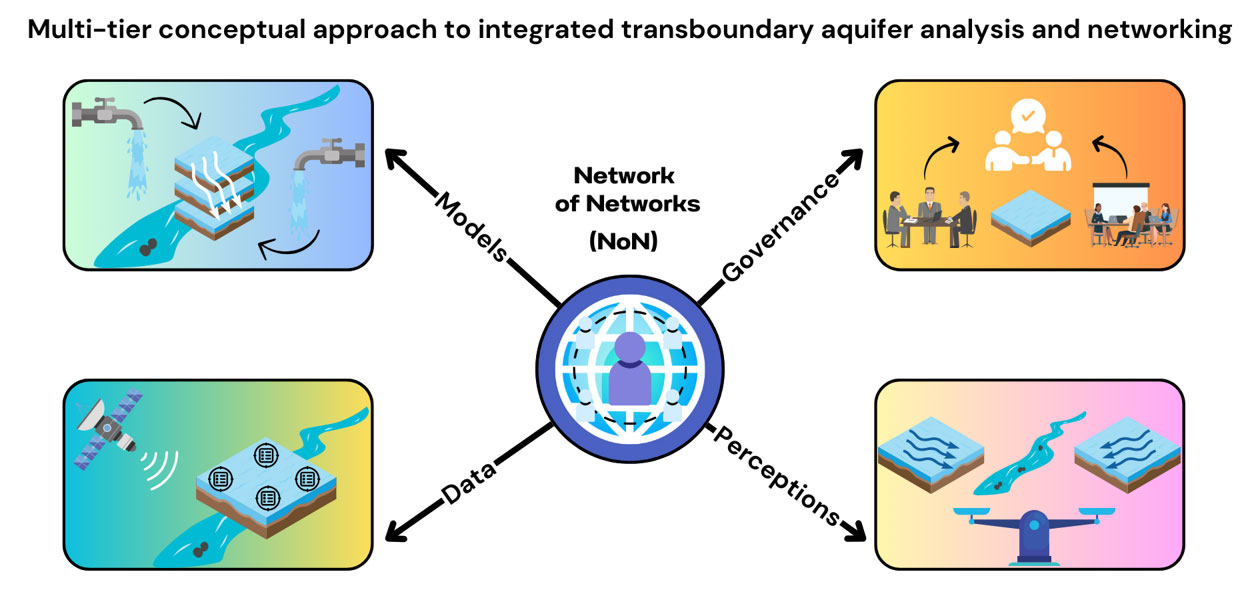News
International Collaboration Aims to Advance Groundwater Resilience in Transboundary Regions
Published May 28, 2024
Kimberly Mann Bruch, SDSC Communications
Groundwater is a critical source of drinking water for nearly half of the world’s population. A research team led by the San Diego Supercomputer Center (SDSC) at UC San Diego, is set to improve our understanding of groundwater dynamics and forge innovative solutions aimed at accurate groundwater assessment. Recognizing the critical importance of clean water, researchers from six countries — the U.S., Ukraine, Poland, Latvia, Lithuania, and Estonia — have joined forces with the SDSC team to address this persistent global challenge.
Titled “Groundwater Resilience Assessment through iNtegrated Data Exploration for Ukraine (GRANDE-U),” this two-year project has been jointly funded by the U.S. National Science Foundation (NSF), Estonian Research Council (ETAG), Latvian Council of Science (LCS), Research Council of Lithuania (LMT), National Science Center of Poland (NCN), U.S. National Academy of Sciences and Office of Naval Research Global (DoD). The SDSC team is led by Principal Investigator (PI) Ilya Zaslavsky, director of the SDSC Spatial Information Systems Laboratory; Co-PI Christine Kirkpatrick, director of the SDSC Research Data Services Division and Co-PI Ashley Atkins, SDSC chief of staff.
“Groundwater assessment is especially challenging in transboundary regions, where disjointed data collection, uneven sensor networks, incompatible hydrogeologic descriptions and lack of international coordination on water management impede data sharing, modeling and aquifer management,” explained Zaslavsky, who leads this multi-country effort. “Our objective is to integrate hydrogeologic models with satellite and ground-based observations and deliver highly detailed and timely predictions of groundwater storage and flows across borders.”
By harnessing the power of data science and artificial intelligence, the SDSC GRANDE-U team aims to overcome the limitations of traditional ground observation networks. Remote sensing for groundwater assessment is particularly important in regions like Ukraine, and especially in its western parts. This area, heavily dependent on aquifers for drinking water, has seen a sharp rise in water demand following dramatic population displacement from the country's eastern regions.

"Addressing this challenge transcends the capabilities of any single nation or discipline," said Oleksii Shevchenko, chief scientist at the Ukrainian Hydrometeorological Institute in Kyiv and leader of the Ukrainian project team, which also includes researchers from Taras Shevchenko National University of Kyiv. "By pooling our expertise and resources, we can make significant advancements in integrated water balance assessment and groundwater modeling."
The project's research design emphasizes collaboration and knowledge-sharing, laying the groundwork for an internationally engaged workforce and fostering state-of-the-art innovation infrastructure in Ukraine. This is particularly crucial amidst the challenges of the current period and the impending need of post-war reconstruction.
“Beyond the technical challenges of groundwater hydrology, this project also delves into the economic, social and political factors affecting groundwater storage and dynamics,” Atkins said. “We aim to understand the role that perceptions play in water decision-making and by working with transboundary water resource experts on our international team, we strive to enhance the credibility and reliability of our models.”
"Water knows no borders,” said Tatiana Solovey, leader of the Polish team and a professor in the Department of Groundwater Assessment and Protection at the Polish Geological Institute. "By working together across borders, we can secure the sustainable management of our shared water resources for generations to come."
A culmination of international research and networking efforts, the GRANDE-U project builds upon the foundation laid by the NSF AccelNet Transboundary Groundwater Resilience team, led by Alexander Fernald from New Mexico State University (NMSU), and the EU-WATERRES team guided by Tatiana Solovey. Both Fernald and Solovey play key roles in driving the GRANDE-U initiative forward. The international project team also includes Julie Christopher from SDSC, Christine Tang from NMSU and Worcester Polytechnic Institute; Justyna Śliwińska from the Space Research Center of the Polish Academy of Sciences; Vasil’ Grebin and Valentyn Khilchevskyi from Taras Shevchenko National University of Kyiv; Kateryna Boiko and Hanna Bolbot from the Ukrainian Hydrometeorological Institute; Argo Jõeleht from the University of Tartu and Andres Marandi from the Geological Survey of Estonia; Inga Retike from the University of Latvia; and Vytautas Samalavičius and Gintaras Žaržojus from Vilnius University, Lithuania.

